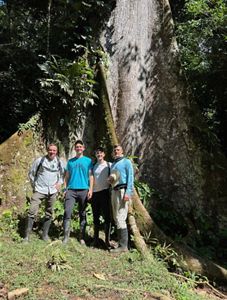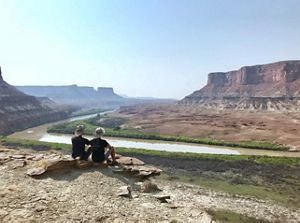
When reflecting on my childhood, my parents like to share the story of when we found baby birds that had fallen from their nest in our suburban backyard. I insisted on saving them. I wanted to be a voice for nature, empathetic to creatures great and small. Not long after, I would watch those same birds perch on powerlines and fly across the street to a small, wooded oasis—a place where I would also fill quart-sized buckets full of blackberries and catch fireflies at dusk with my neighbors. We would later watch those woods slowly succumb to development, making room for more homes. It wasn’t until I listened to the wedding speeches of two close friends that I realized just how cherished that small, but mighty woodsy retreat was. It’s what led me to start volunteering at a wildlife rehabilitation center with my dad at the age of fifteen and later pursue a degree in Forestry, Fisheries and Wildlife at The Ohio State University.
As the years went on, I knew I was in the right field, but sometimes felt that the “magic” or “mystery” of nature that spurred my childlike curiosity was absent from my studies. The emotion and human connection of conservation felt neatly boxed and separated from our focus, in a way that nature wouldn’t organically encourage. I was also struggling at the time with my own identity. It would take me years to find myself, and when I finally came out to close family and friends at the age of 19, I quickly learned what it was like to jump into the deep end of the pool—my privileged life had an awakening. When my partner Matthew and I first visited a remote nature preserve, we found ourselves looking over our shoulders, releasing our embraced hands when others approached and questioning our safety. It was in that moment that I realized that not everyone experiences the same right and access to nature as we should.

As I began my journey with The Nature Conservancy, I quickly discovered a growing passion for engaging people in our mission. I joined diversity, equity, and inclusion initiatives to help forge this sometimes-missing piece that is so foundational to our success in conservation—people. This work recognizes that there were many before us, and who are still here, who have a deep connection, appreciation and respect for the natural world, a relationship that existed long before colonialism saw nature as something to be sold. Nature is not a resource to be extracted, but a beautiful, synergetic relationship of which we are all a part.
As one of the largest private landholders in the country, TNC plays a key role in creating access and equity in conservation. We have a commitment to diversity and respect for people, communities and cultures, and how this shows up in our work is critical. Diverse communities have diverse needs, and to effectively create equity, we must build trust by centering the experience of underrepresented communities in conservation. TNC is working across more than 79 countries and territories, and as we continue to achieve global results, we must understand how this work engages people across language, culture, political boundaries and all layers of diversity.
Sign Up to Receive Nature News
People and nature are inextricably linked, and it will be people who help solve the world’s greatest environmental challenges. But we must also recognize that it is people who are unfairly impacted by these challenges. In looking to the future of conservation, we must continue to build meaningful relationships with communities that we have not traditionally engaged. This means supporting the vision and voice of Indigenous Peoples and local communities that have thrived for thousands of years in harmony with nature.
During my undergraduate studies, I can’t recall many discussions about how climate change disproportionately impacts communities. Today, however, we have a better understanding of how this is playing out. Extreme weather events like hurricanes and flooding have a more severe impact on low-income communities with substandard housing and inadequate protection against flood events. And Indigenous communities that rely on agriculture are at a higher risk of food insecurity due to the impact of climate change on crop yields and water availability. These are just a few examples that TNC is working to change by measuring the global implications of climate change on our most vulnerable communities. We’re using this data across the world to inform equitable investments and ensure we include those most vulnerable to climate change in our planning. I find this incredibly inspiring and hopeful!


Centering people and community in our conservation work not only requires us to rethink our approach to conservation, but also how we measure impact. It’s easy to count dollars raised and acres protected, but a values-based approach to philanthropy and conservation is much more meaningful. Building deeper relationships with our supporters and centering diversity, equity and inclusion increases dollars raised, strengthens trust in TNC and ultimately deepens our impact.
Quote: Chad Duplain
When we lead with values-based philanthropy, it impacts who ends up joining our boards and how we show up in partnerships, both of which are essential to our conservation success.
Through trust, transparency and authenticity, I strive to create a culture of inclusivity in our supporters through intentional outreach, active listening and acknowledging and repairing past harms as we engage diverse communities. I believe that reinforcing our values with all donors we engage is an important part of how we walk the talk in achieving our mission. When we lead with values-based philanthropy, it impacts who ends up joining our boards and how we show up in partnerships, both of which are essential to our conservation success. When we actively engage LGBTQ+, BIPOC and younger communities in our work, there is an added co-benefit that these communities often support initiatives that are equitable because equity is something that is critical in our everyday lives.
On a recent trip to the Peruvian Amazon, my partner and I re-discovered what it meant to be in absolute awe at the beauty, connection and curiosity of nature—a right, I believe, that should be experienced and cherished by all, equitably and inclusively. I find this same connection to nature closer to home too. When I am digging my hands in the dirt while planting my garden, breathing in the fresh air of a forest or even watching my dog, Finnigan, play with deer in our backyard, I am constantly reminded of the peacefulness of the natural world. I find this to be motivating, tranquil and inspiring all at the same time. And in my work with TNC, I find a deep sense of purpose in helping to reignite this connection between people and nature towards the common goal of protecting planet Earth for all.




